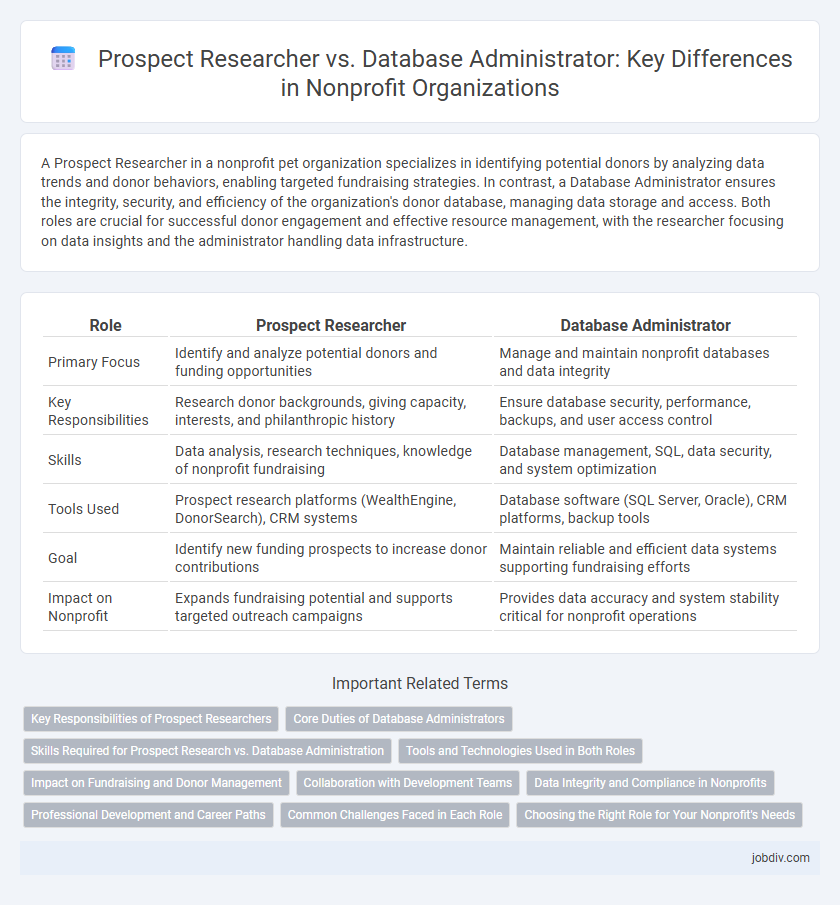A Prospect Researcher in a nonprofit pet organization specializes in identifying potential donors by analyzing data trends and donor behaviors, enabling targeted fundraising strategies. In contrast, a Database Administrator ensures the integrity, security, and efficiency of the organization's donor database, managing data storage and access. Both roles are crucial for successful donor engagement and effective resource management, with the researcher focusing on data insights and the administrator handling data infrastructure.
Table of Comparison
| Role | Prospect Researcher | Database Administrator |
|---|---|---|
| Primary Focus | Identify and analyze potential donors and funding opportunities | Manage and maintain nonprofit databases and data integrity |
| Key Responsibilities | Research donor backgrounds, giving capacity, interests, and philanthropic history | Ensure database security, performance, backups, and user access control |
| Skills | Data analysis, research techniques, knowledge of nonprofit fundraising | Database management, SQL, data security, and system optimization |
| Tools Used | Prospect research platforms (WealthEngine, DonorSearch), CRM systems | Database software (SQL Server, Oracle), CRM platforms, backup tools |
| Goal | Identify new funding prospects to increase donor contributions | Maintain reliable and efficient data systems supporting fundraising efforts |
| Impact on Nonprofit | Expands fundraising potential and supports targeted outreach campaigns | Provides data accuracy and system stability critical for nonprofit operations |
Key Responsibilities of Prospect Researchers
Prospect Researchers in nonprofits analyze donor data, identify funding opportunities, and develop detailed profiles on potential donors to support effective fundraising campaigns. They gather intelligence on individuals, corporations, and foundations to align donor interests with organizational goals. Their key responsibilities include data mining, wealth screening, and providing strategic insights to advance donor engagement and maximize contributions.
Core Duties of Database Administrators
Database Administrators in nonprofit organizations manage and maintain the integrity, security, and accessibility of donor databases, ensuring accurate data entry and seamless integration with fundraising platforms. Their core duties include optimizing database performance, performing regular backups, and troubleshooting data-related issues to support efficient prospect research and donor management. By safeguarding data and enabling reliable reporting, they play a crucial role in enhancing fundraising strategies and donor engagement efforts.
Skills Required for Prospect Research vs. Database Administration
Prospect researchers need strong analytical skills, proficiency in data mining tools, and expertise in identifying donor patterns and wealth indicators to support fundraising strategies effectively. Database administrators require technical knowledge in database management systems, data security, and backup recovery, along with problem-solving skills to ensure data integrity and system performance. Both roles demand attention to detail and the ability to work with large datasets, but prospect research emphasizes data analysis for prospect identification, while database administration focuses on system maintenance and data governance.
Tools and Technologies Used in Both Roles
Prospect Researchers primarily utilize data analytics software, CRM platforms like Salesforce and Raiser's Edge, and online databases such as LexisNexis to identify and evaluate fundraising prospects. Database Administrators rely on database management systems including SQL Server, Oracle, and MySQL, focusing on data integrity, backup solutions, and performance tuning to ensure seamless access and security of donor information. Both roles collaborate with data visualization tools like Tableau and Power BI to generate actionable insights for nonprofit fundraising strategies.
Impact on Fundraising and Donor Management
Prospect Researchers enhance fundraising efforts by identifying and qualifying potential donors through detailed data analysis, enabling nonprofits to target high-value prospects effectively. Database Administrators ensure the integrity, security, and accessibility of donor information within CRM systems, facilitating accurate segmentation and personalized donor engagement. Together, their collaboration optimizes fundraising strategies and strengthens donor relationship management, maximizing revenue growth and donor retention.
Collaboration with Development Teams
Prospect Researchers and Database Administrators collaborate closely with development teams to enhance fundraising strategies and donor management. Prospect Researchers provide in-depth donor insights and wealth screening data, enabling targeted outreach, while Database Administrators ensure the integrity, security, and accessibility of donor information within CRM systems. This synergy streamlines donor engagement processes and optimizes campaign performance for nonprofit organizations.
Data Integrity and Compliance in Nonprofits
Prospect Researchers and Database Administrators play crucial roles in nonprofit organizations by ensuring data integrity and compliance with regulations like GDPR and HIPAA. Prospect Researchers analyze and validate donor information to identify qualified leads while Database Administrators maintain secure, accurate databases and implement access controls. Together, their collaboration protects sensitive donor data, supports ethical fundraising practices, and upholds regulatory compliance.
Professional Development and Career Paths
Prospect researchers in nonprofits specialize in identifying and analyzing potential donors, developing skills in data analysis, fundraising strategies, and relationship management, which can lead to advanced roles in major gift officer positions or development director roles. Database administrators focus on structuring, maintaining, and securing donor and fundraising databases, requiring expertise in data management systems, cybersecurity, and software tools, paving the way to senior IT management or nonprofit technology leadership roles. Both career paths offer professional development opportunities through certifications such as Certified Fund Raising Executive (CFRE) for prospect researchers and Certified Information Systems Security Professional (CISSP) for database administrators.
Common Challenges Faced in Each Role
Prospect researchers often face challenges in managing data accuracy and identifying reliable donor information, which directly impacts fundraising outcomes. Database administrators struggle with maintaining data integrity and ensuring seamless integration across nonprofit software systems, which can hinder efficient data retrieval. Both roles require collaboration to overcome data fragmentation and streamline donor management processes.
Choosing the Right Role for Your Nonprofit's Needs
Prospect researchers specialize in identifying and analyzing potential donors to enhance fundraising strategies, using data-driven insights to prioritize outreach efforts. Database administrators focus on maintaining and optimizing nonprofit data systems, ensuring accurate, secure, and accessible records to support organizational operations. Selecting the right role depends on your nonprofit's immediate goals: prioritize a prospect researcher for targeted fundraising growth or a database administrator for robust data management and system reliability.
Prospect Researcher vs Database Administrator Infographic

 jobdiv.com
jobdiv.com